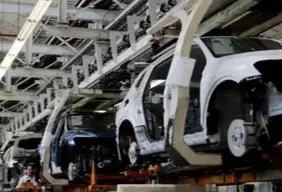The Trump administration’s 25 percent tariff on all cars not manufactured in the United States will have an impact on states like Puebla, since 61.7 percent of exported vehicles are primarily destined for the United States.
In the first two months of this year alone, the Audi and Volkswagen assembly plants, based in Puebla, exported a total of 41,708 units to different parts of the world.
Of that volume, 25,748 were sold in the neighboring country; that is, six out of every 10 cars exported are sold in that region.
According to data from the Administrative Registry of the Light Vehicle Automotive Industry (RAIAVL), four vehicles are manufactured in Puebla: Audi produces the Q5 model in different versions, which is exported to almost the entire world except China.
The record published by the National Institute of Statistics and Geography (INEGI) shows that the four-ring plant, located in the municipality of San José Chiapa, exported a total of 13,733 units of that model in the first two months of this year, of which 6,789, or almost half, reached the US market.
Volkswagen, whose production plant is located in the municipality of Cuautlancingo, manufactures the Jetta, Tiguan, and Taos models.
Of these, 27,795 units were exported during the first two months of 2025, of which 18,959 arrived in the US. Of the Taos model alone, 16,396 units were shipped, while 11,278 were shipped for the Jetta and 301 for the Tiguan.
The rest of the vehicles manufactured in Puebla are destined for Germany, Canada, South American countries, Southeast Asia, and the Mexican market.
With President Donald Trump’s announcement of the imposition of tariffs on cars not assembled in the United States, Puebla would lose competitiveness, since the export of vehicles and auto parts is the basis of the state’s trade with its neighboring country to the north.
According to Guillermo Malpica Soto, investment advisor for the Mexican Foreign Trade Council (COMCE) in the southern region, the application of tariffs would make cars in the United States more expensive by up to $6,000, which would trigger lower demand for units.
He considered that the strategy that automakers will implement regarding the measure remains to be seen, since the price of each vehicle can vary depending on the proportion of auto parts included in trade agreements.
“Of course, we’d have some impact on production here, which would remain for consumption, but we don’t know what the automakers’ strategy will be as they lose competitiveness in the US market. They won’t find alternative markets overnight,” he noted.

Source: amp.milenio




